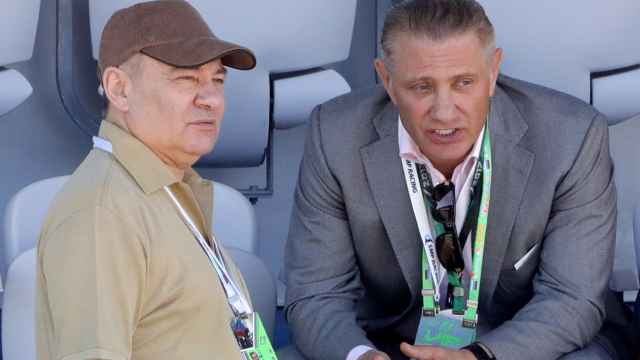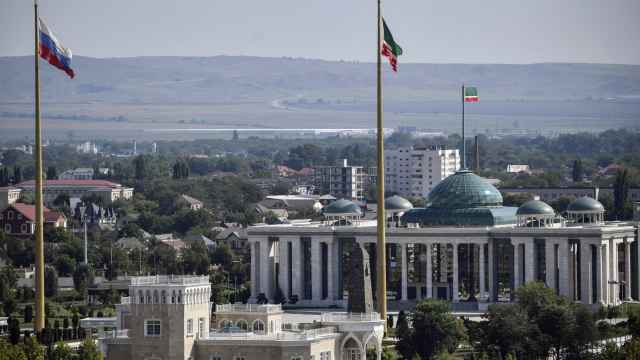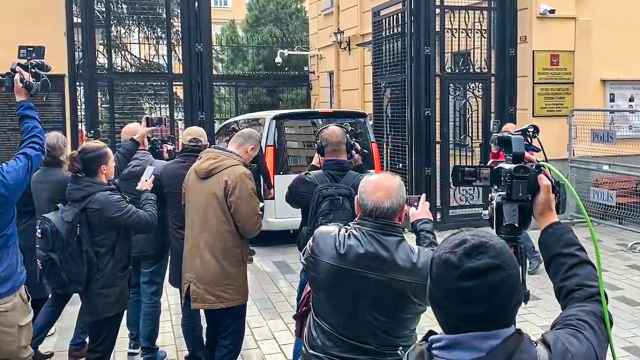 Alexei Pankin
Alexei Pankin
Journalist Oleg Kashin, who was savagely beaten near the entrance to his home, published a commentary piece on the Svobodnaya Pressa (Free Press) website analyzing why an influential national daily newspaper is so strongly supportive of President Vladimir Putin.
In that piece, Kashin referred to one of the senior editors as "some special Jew whose name I don't recall."
Reading that line, I immediately recalled the odious Komsomolskaya Pravda journalist Ulyana Skoibeda. She once made openly anti-Semitic statements during an argument she held on the newspaper's website with prominent liberal politician Leonid Gozman, who had compared SMERSH, the Soviet counterintelligence agency during World War II, with the Nazi SS. That unleashed a storm of controversy in the media and on social networks.
After that, Skoibeda was punished by her editors and made repeated public apologies. Even the Komsomolskaya Pravda editor-in-chief apologized for her conduct, promising to introduce strict censorship of their online content and even thanking the Roskomnadzor media regulator for issuing a warning.
So after reading the anti-Semitic statements by Kashin, who is also a member of the opposition's Coordinating Council, I awaited a similarly strong reaction from his fellow opposition members. But it never came. More than 30 days have passed since his words were published. Apparently, Russia's pro-democracy champions seem to have rephrased an old U.S. adage, maintaining, "Sure, he's an anti-Semite, but he's our anti-Semite."
Just the same, I read Kashin's next article in Svobodnaya Pressa titled "I, Navalny." That got me wondering about the views held by Alexei Navalny, the idol of the Moscow opposition.
Moskovsky Komsomolets deputy editor Aider Muzhdabayev had asked Navalny several questions through Facebook intended to clarify his position on ethnic issues. He asked Navalny if it were true that he had once called an Azeri employee a "black-skinned [expletive]" and that at the start of the Russia-Georgia War in August 2008 he had referred to "Gruzin" (Georgians) as "gryzunami" (rodents).
Navalny replied more or less as follows: "I am a great man, and great people are always surrounded by rumors. I don't want to waste time explaining myself to a mindless and lazy journalist. Here's a link to online resources where you can learn about my position."
State Duma Deputy Andrei Isayev was the last person in my memory to act so rudely toward the media. Commenting on a Moskovsky Komsomolets article titled "Political Prostitution Undergoes Sex Change," Isayev wrote on Twitter a few months ago, "That yellow rag waged a vile, cheap and dirty attack against three female Duma deputies."
Ironically, the author of that much-maligned headline and the object of Isayev's wrath was none other than the same deputy editor who corresponded with Navalny. Apparently Muzhdabayev is one of those journalists whose task it is to be insulted by not only members of the ruling party, but also by the opposition.
In all fairness, Muzhdabayev courageously engaged in a heated argument with the authorities and offered effusive thanks to Navalny live on Radio Liberty for honoring him with a response.
I wish the liberal media and the democratic opposition continued success in their common search for truth.
Alexei Pankin is the editor of WAN-IFRA-GIPP Magazine for publishing business professionals.
A Message from The Moscow Times:
Dear readers,
We are facing unprecedented challenges. Russia's Prosecutor General's Office has designated The Moscow Times as an "undesirable" organization, criminalizing our work and putting our staff at risk of prosecution. This follows our earlier unjust labeling as a "foreign agent."
These actions are direct attempts to silence independent journalism in Russia. The authorities claim our work "discredits the decisions of the Russian leadership." We see things differently: we strive to provide accurate, unbiased reporting on Russia.
We, the journalists of The Moscow Times, refuse to be silenced. But to continue our work, we need your help.
Your support, no matter how small, makes a world of difference. If you can, please support us monthly starting from just $2. It's quick to set up, and every contribution makes a significant impact.
By supporting The Moscow Times, you're defending open, independent journalism in the face of repression. Thank you for standing with us.
Remind me later.





